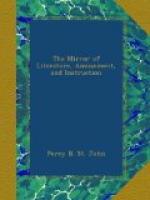“Permit me to relate to you an incident. About a fortnight ago, Sir James Hall,[8] an English gentleman, on his way from Paris to Cherbourg, stopped his coach at our door, and came up to my chamber. I was in bed at six o’clock in the morning, but having flung on my robe de chambre, I met him at the door of the ante-chamber. I was glad to see him, but surprised. He observed, that he had endeavoured to make up his opinion of me, with as much exactness as possible, and concluded that no kind of visit whatever would surprise me. I could do no otherwise than remark, that his opinion surprised me at least, and the conversation took another turn. In walking across the chamber, he laughingly put his hand on a six livre piece, and a louis d’or that lay on my table, and with a half stifled blush, asked me how I was in the money way. Blushes commonly beget blushes, and I blushed partly because he did, and partly on other accounts. ‘If fifteen guineas,’ said he, interrupting the answer he had demanded, ‘will be of any service to you, there they are,’ and he put them on the table. ’I am a traveller myself, and though I have some fortune to support my travels, yet I have been so situated as to want money, which you ought not to do. You have my address in London.’ He then wished me a good morning and left me. This gentleman was a total stranger to the situation of my finances, and one that I had, by mere accident, met at an ordinary in Paris.”
Ledyard observes, that he had no more idea of receiving money from this gentleman than from Tippoo Saib. “However,” he says, “I took it without any hesitation, and told him, I would be as complaisant to him if ever occasion offered.”
His schemes for a north-west voyage, either for trade or discovery, being now wholly abandoned, he set about planning, as the only remaining expedient, a journey by land through the northern regions of Europe and Asia, then to cross Behring’s Straits to the continent of America, to proceed down the coast to a more southern latitude, and to cross the whole of that continent from the western to the eastern shore. The empress of Russia was applied to for her permission and protection, but while waiting for her answer Ledyard received an invitation to London from his eccentric friend, Sir James Hall. He found, on his arrival there, that an English ship was in complete readiness to sail for the Pacific Ocean, in which Sir James had procured him a free passage, and to be put on shore at any spot he might choose on the north-west coast. The amiable baronet, moreover, presented him with twenty guineas, as Ledyard says, pro bono publico, and with which he tells us, “he bought two great dogs, an Indian pipe, and a hatchet.” In a few days the vessel went down the Thames from Deptford, and Ledyard thought it the happiest moment of his life; but such is the uncertainty of human expectations, while he was indulging in day-dreams of the fame and honour which awaited him, he was once more doomed to suffer the agonies of a disappointment to his hopes, the more severe, as being so near their consummation—the vessel was seized by a custom-house officer, brought back, and exchequered.




